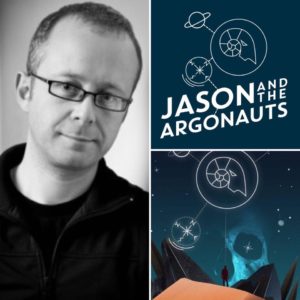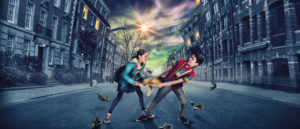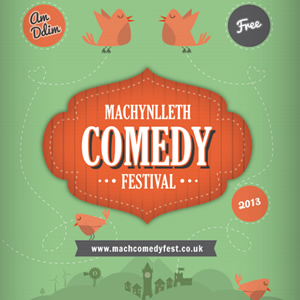
Get the Chance values the role playwrights living and working in Wales bring to the cultural life of our nation. Here is our third interview in this series with playwright Mark Williams.
Hi Mark great to meet you, so what got you interested in writing?
I’ve always loved stories, and was a big reader of books and comics from an early age. I had a great teacher in primary school, who encouraged me to let my imagination run wild in creative writing lessons. I remember vividly the moment when I realised that in a story, you could transform the world, in any way you wanted to. As I got a bit older, I became interested in the ‘behind the scenes’ world of TV and film. Magazines and movie tie-in books often had interviews with writers, and that opened up the idea that writing was a process, and something it was possible to do as a career.
You are a playwright can you explain how this role operates within the creative team on a theatrical production ?
So far, every production has followed a slightly different model. Sometimes my role has more or less ended when rehearsals began. Other times, I’ve been more actively involved, right up until the show opens, and during the run. There can be lots of factors determining the writer’s role, ranging from how the director likes to work, to the needs of the producing company, or your own time commitments on other projects. Ideally, I love it when the process is as collaborative as possible.
You are currently working on a brand new version of the classic legend Jason and the Argonauts. This sounds exciting! Can you please tell us more about your role on this production.
‘Jason’ was first commissioned by the Courtyard Hereford, and undertook a short English regional tour in 2013. This new production of the play developed from meetings with Sharon Casey and Angela Gould (at co-producers Blackwood Miner’s Institute and RCT Theatres). They’d enjoyed my family play for Theatr Iolo (‘Here Be Monsters’), and were keen to develop work for that audience. I’d always wanted to return to ‘Jason & The Argonauts’, as I felt it had the potential to have a further life. This new version is a very collaborative production. Two development periods explored elements such as music, set design, and how to really push the ‘legendary blockbuster’ feel of the story. I worked with one director (Owen Lewis) on an initial R&D, and then in a second development phase this year with Julia Thomas, who is directing the finished production. I’ve redrafted the script several times, as a result of the constructive feedback of the creative team – taking on board suggestions and new ideas, and then filtering them back into the script. Ultimately, my role on this production is to work closely with Julia, to ensure that none of the exciting new ideas are lost, but also that the spirit and tone at the heart of the story is retained.
I believe this new version of the story draws on the original interpretations of the tale, as well as modern stories inspired by Greek myth – from the Marvel Comics Universe, to Star Wars, The Lord Of The Rings and beyond. Do you consider audiences when you approach work of this nature.
Yes, absolutely! Director Julia Thomas is very audience-driven in her approach, and we’ve both had a family audience firmly in mind, at every stage of the process. A modern audience’s expectation of the story was a big part of my inspiration, right from when I first started working on the script. When you mention the title, most people think of the animated skeletons in the 1963 movie! So you’ve got to try to deliver those classic monsters and mythic heroes – but in a theatrical way, with a cast of four brilliant actors. In a wider sense, audiences (myself included!) are just as likely to know the stories listed above, as they are the legends that inspired them. There’s no “standard version” of Jason’s story, and there’s a great creative freedom in seeing it as taking place “out of time”. Our version of Jason’s ship The Argo could be a space-ship, just as much as a sailing vessel. I’m also constantly reminding myself that this adaptation should be a fun and exciting story – one that also hopefully has something to say to a modern audience, about what it means to be a human hero.
The marketing materials for the production reference lots of popular culture and films. With increased competition for live performances from on demand TV like Netflix. Do you think theatre can offers something different for audiences from film and TV?
I do! Modern audiences are very sophisticated, and well-versed in a wide range of storytelling, with a lot of entertainment competing for their time and money. But what theatre has is its immediacy and communal atmosphere – the excitement of taking people on a journey, together, in a live setting. We’ve approached this version of Jason & The Argonauts as being a fantastical playground, where we can have fun with all the theatrical tools at our disposal – music and sound, imaginative set design, stage combat and effects and illusions.

Here Be Monsters, Theatr Iolo
You have written a range of family production ranging from Horrible Histories, Here Be Monsters for Theatr Iolo to this new production of Jason and the Argonauts. Family productions are often many audience members first points of access to live theatre. Is this something you ever consider when writing and developing your work?
Very much so. I went to a Family Arts conference last year, and was struck by the statistic that most families only go to see a live theatre show once or twice a year. Which is not so surprising, when you consider how expensive a family night out can be. So you really want to push value for money, as much as possible. We’ve approached every scene as almost being a mini-story in itself, asking questions like: “what are the big set-piece moments?” and “what do we want people to be buzzing with excitement about, after the show?”
If you were able to fund an area of the arts in Wales what would this be and why?
Increasingly, a lot of my work is inspired by my native Pembrokeshire, and I’d love to see more funding for the arts there, to expand on the great work already being done in the local arts scene. I’d also love to see more promotion of, and focus on, genre writers, particularly in sci-fi, fantasy and horror. Wales has produced some brilliant and prolific authors in their field, writers like Tim Lebbon and Jo Walton, and I think we should champion them a lot more than we do.

What excites you about the arts in Wales? What was the last really great thing that you experienced that you would like to share with our readers?
I love the diversity of work, how eclectic it is. How we can produce world-class plays, music and opera; brilliant comedy like The Harri Parris and the Mach Comedy Festival, and innovative productions at The Other Room, that transform a small space with flair and invention. Lucy Rivers’ recent Sinners Club was brilliant – wonderful writing and performance. I loved the Llawn Festival last year, an eclectic mix of lovingly-curated art, taking place in Llandudno. And I’m a huge Meilyr Jones fan – his live shows are incredible, and I can’t wait to hear what he comes up with next.
www.jasonandtheargonauts.co.uk
Jason and the Argonauts, tour dates.
April 2017
The Park & Dare, Treorchy
Friday 7th 6pm
Borough Theatre, Abergavenny
Monday 10th 2.30pm
Maesteg Town Hall, Maesteg
Tuesday 11th 2pm
Theatr Brycheiniog, Brecon
Wednesday 12th 2pm & 7pm
Blackwood Miners’ Institute, Blackwood
Thursday 13th 1pm & 4pm
The Weston Studio,
Wales Millennium Centre, Cardiff
Friday 14th 7.30pm
Saturday 15th 2.30pm & 7.30pm
Torch Theatre, Milford Haven
Tuesday 18th 1pm & 4pm
The Welfare, Ystradgynlais
Wednesday 19th 2pm
The Hafren, Newtown
Thursday 20th11am & 1.30pm
Neuadd Dwyfor, Pwllheli
Friday 21st 2.30pm & 7.30pm
The Met, Abertillery
Wednesday 26th 1pm & 7.30pm
